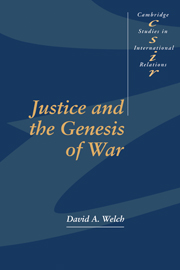Book contents
Foreword
Published online by Cambridge University Press: 15 October 2009
Summary
David Welch's book is a welcome contribution to a field – the study of international relations – that all too often degenerates into scholasticism, or develops theories on far too slender an empirical base, or provokes heated debates on arcane questions. Here we have solid academic analysis that is also relevant to the world of policy.
Professor Welch's careful and lucid examination of the role played by considerations of justice in the outbreak of wars has many merits. One of the most obvious is that it is written without jargon, and therefore suggests that even complex issues can be presented in such a way that not only initiates understand them. Another merit is the empirical research he has done in a domain – history – that has been neglected far too often by model-builders on the one hand, and on the other by students who seem to believe that the world, and the study of its politics, began around 1945.
Even more important is Welch's criticism of the kind of “Realism” that has tended to dominate the field, and which rational choice analysis reinforces: a truncated and desiccated view of reality that singles out state interests and calculations of power, and leaves out all the passions and emotions that shape the definition of interests, the hierarchy of preferences, and the objectives of power.
- Type
- Chapter
- Information
- Justice and the Genesis of War , pp. xiii - xivPublisher: Cambridge University PressPrint publication year: 1993
- 10
- Cited by



